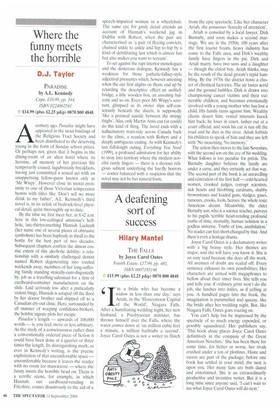Where the funny meets the horrible
D.J. Taylor
PARADISE by Al. Kennedy Cape, £16.99, pp. 344, ISBN 0224062581 £14.99 (plus £2.25 p&p) 0870 800 4848 Acentury ago, Paradise might have appeared in the stout bindings of the Religious Tract Society and been distributed to the deserving young in the form of Sunday school prizes. Or perhaps not, given that it begins in the dining-room of an alien hotel where its heroine, all memory of her previous life temporarily erased, lugubriously breakfasts, having just committed a sexual act with an unappetising fellow-guest known only as 'Mr Wispy'. However close its moral proximity to one of those Victorian temperance hymns with titles like 'Don't sell no more drink to my father', A.L. Kennedy's third novel is, in its relish of bedrock-level physical detail, quite thoroughly up to date.
By the time we first meet her, at 8.42 a.m. here in this low-ceilinged amnesiac's hellhole, late-thirtysomething Hannah Luckraft (her name one of several pieces of obtrusive symbolism) has been haplessly in thrall to the bottle for the best part of two decades. Subsequent chapters confirm the almost cosmic extent of this alcoholic debility: a relationship with a similarly challenged dentist named Robert degenerating into sozzled weekends away: members of her long-suffering family standing stoically-cum-disgustedly by; job as a travelling salesman for a firm of cardboard-container manufacturers on the slide. Laid seriously low after a particularly violent binge, Hannah is scraped off the floor by her doctor brother and shipped off to a Canadian dry-out clinic. Here, surrounded by all manner of weeping confidence-brokers, the bolshie ingrate plots her escape.
Paradise's length — upwards of 100,000 words — is, you feel, more or less arbitrary. As the study of a consciousness rather than a conventionally ordered piece of fiction it could have been done at a quarter or three times the length. Its distinguishing mark, as ever in Kennedy's writing, is the precise exploitation of that uncomfortable space — uncomfortable because it leaves the reader with no room for manoeuvre — where the funny meets the horrible head on. There is a terrific scene, for example, in which Hannah, out cardboard-vending in Fifeshire, comes disastrously to the aid of a speech-impaired woman in a wheelchair. The same eye for grisly detail attends an account of Hannah's weekend jag in Dublin with Robert, when the pair are characterised as 'a pair of fleeing convicts, chained ankle to ankle and hip to hip by a kind of debilitating lust which is almost fun but also makes you want to scream'.
To set against the rapt interior monologues and the dexterous dialogue, Kennedy has a weakness for those pathetic-fallacy-style adjectival pirouettes which, however arresting when the eye first alights on them, end up by retarding the descriptive effect: an unlike* bridge, a lithe wooden box, an unwitting balcony and so on. Even poor Mr Wispy's scrotum, glimpsed as its owner slips self-consciously beneath the sheets, is supposedly 'like a perineal suicide between the string thighs'. Alas, only Martin Amis can (or could) do this kind of thing. The novel ends with a hallucinatory train-ride across Canada back to the clinic, a reunion with Robert and a deeply ambiguous ending. As with Kennedy's last full-length outing, Evelything You Need (1999), a profound admiration for her ability to stray into territory where the modern novelist rarely lingers — there is a devious religious subtext underlying the bar-fly horrors — comes balanced with a suspicion that the novel may not be her natural form.










































































 Previous page
Previous page